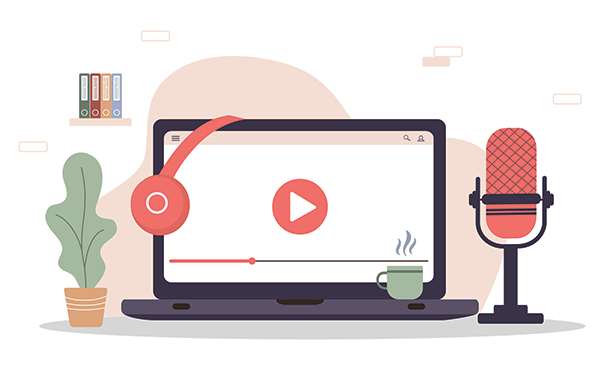Podcasts weren’t always a hit. They were first called “audio blogs” until 2004 when the word “podcast” was created. Podcasting started in the early 2000s as a niche format for those discussing hobbies or exploring new tech. By 2006, about 11% of Americans had listened to a podcast. As smartphones became popular and people sought new ways to share content, podcasting gained traction in the mid-2010s. In 2020, 55% of the U.S. population had tuned into a podcast. With the ongoing growth of digital marketing, content marketers who haven’t yet done so should think about adding podcasts to their marketing strategy.
- 37% of Americans, 104 million people, listened to and/or viewed a podcast in the last month
- 51% of podcast listeners are male
- 48% of podcast listeners are between the ages of 12 and 34
- 49% of people listen to podcasts while at home
Benefits of Adding Podcasts to Content Marketing Efforts
Adding podcasts to content marketing can yield similar benefits as blogs and eBooks, but also unique advantages that can help organizations gain a competitive edge.
Grow Your Audience and Build Awareness
No matter what hobbies or interests someone has, there is probably a podcast that fits them well. Since podcasts can connect with audiences around the world, targeting isn’t restricted to just one location. Podcasts reach individuals who prefer different ways of consuming content. While expanding audience size and awareness is crucial, it’s also important to connect with your specific target audience. Concentrating content on pain points and challenges will help deliver relevant content to the right customers.
Establish Thought Leadership
Podcasting enables the demonstration of expertise and establishes thought leadership. In B2B, gaining a reputation as an industry expert goes a long way. Communicating relevant, impactful content on a podcast can help establish or further thought leadership recognition.
Convenient and Engaging
Creating engaging and easy-to-consume content can be a challenge for content marketers. With podcasts, people can listen to them anywhere and at any time on a variety of devices. Plus, many podcast episodes are 30 to 45 minutes, with some being even shorter. Either way, less than an hour is relatively short and can be the time it takes for a person to go on an evening walk, take a lunch break, or drive from one location to another. Listening to podcast episodes is a convenient and enjoyable way to pass the time.
Content is Easy to Create and Repurpose
Content marketers usually have a knack for writing and creativity, but it’s always a great idea to look for additional ways to create content faster. With podcasts, you need a good topic, a plan on what to discuss and basic audio and recording equipment. Additionally, 30-45 minutes of audio can be repurposed into multiple content pieces. Imagine the number of blogs and eBooks that can be created from just one episode of a podcast!
Getting Started with Your Podcast
Ready to take the next step and start a podcast? Here are some strategies and tips to get started.
Define Your Why
You’re committed to creating a podcast but what is the purpose? What are some goals? Having a “why” behind a podcast can help stay on track to producing the most useful content and reaching the right audiences. Setting goals before the launch can guide strategy efforts.
Determine Your Style
There are a few different podcasting styles to utilize. You might have listened to podcasts led by one person, co-hosted, a panel or even interview style. While the style to pursue is ultimately up to your team, the most successful business podcasts are Q&A/interview style or panel style.
Interview-style episodes allow you to host a variety of people. For example, inviting a current customer, prospect, or even another team member can fuel engaging content for listeners. Panel-style episodes enable multiple people and perspectives on a single episode. This delivers healthy discussion, various viewpoints and diverse content among the panelists. When a panel consists of current customers, this can also establish trust and indicate to listeners your brand is trustworthy and authentic.
Create a Process
Numerous factors go into producing a podcast. Content creation, scheduling, recording, editing and promotion are a few. It’s necessary to create a process that works for your team and allows activities to be streamlined.
Equipment Needs
One of the perks of podcasting is there are only a few pieces of equipment necessary to get started. You will need a microphone or device to record the episode, a computer to store and edit the audio content and a place to host it, whether it be on a website or a platform like Apple Music or Spotify.
Elevate Content Marketing with Podcasting
Content marketing is an effective strategy to engage audiences and convert prospects to leads. As the demand for immediate, easy to consume digital content is on the rise, podcasting provides an avenue for content marketers to capitalize on. With the many opportunities and benefits podcasts bring to content marketers, it’s worth looking into as an addition to your content marketing mix.
